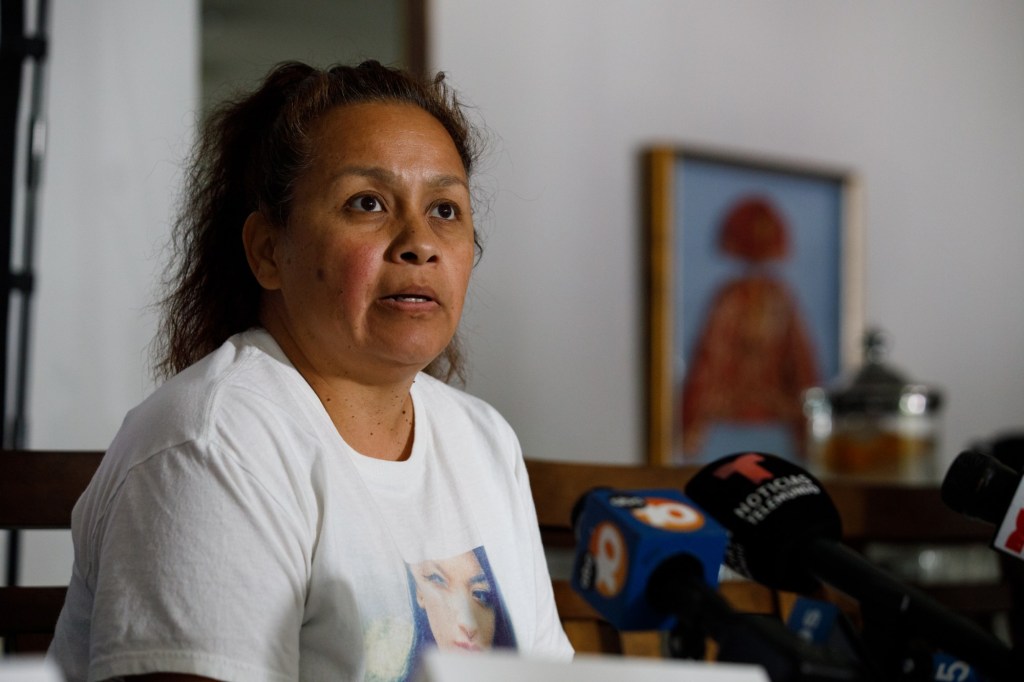
Almost as soon as they learned their oldest daughter had died in a San Diego County jail, Paloma and Michael Serna became activists — raising awareness of her case, pushing prosecutors to file criminal charges and pressing the sheriff for details that would take years to uncover.
The couple, who lived in Montana, even invited a reporter to share their last goodbye for Elisa Serna at a Kearny Mesa crematory. They wanted to sound an alarm over the anguish and despair so often caused by drug and alcohol abuse.
“She was like a second mother to all of her siblings,” Michael Serna said that November day in 2019. “She had her problems, but…”
The distraught father’s voice sank into silence.
Elisa Serna, 24 years old and five weeks pregnant, had died inside the Las Colinas women’s jail just days she was arrested on suspicion of theft and drug charges.
At booking, she told sheriff’s deputies she was addicted to alcohol and drugs but she was never placed into the department’s withdrawal protocols. Video evidence released years later showed her writhing in distress through the last day of her life, shuddering and vomiting repeatedly.
Before she died on Nov. 11, 2019, a nurse and deputy left her alone on the floor of her cell after she had collapsed and struck her head. Elisa Serna was found dead in the same position, huddled on the floor in a pool of her own urine an hour later.
Some 1,200 miles away, the phone rang at the Sernas’ family home.
It was the San Diego County Sheriff’s Office. Roused from sleep just after 6 a.m., Elisa’s parents were given only the most basic information: Their daughter had died after using drugs and being booked into jail. She got sick, and she never recovered, they were told.
The next five years were an exercise in frustration and outrage.
Getting even rudimentary facts about what happened to their daughter proved almost impossible for the Sernas.
They asked nicely. They complained before public boards. They protested repeatedly outside jails and the Sheriff’s Office. They demanded an investigation and criminal charges against those they held responsible.
Finally, nearly a year after losing their daughter, they hired a lawyer and sued.
This July, San Diego County agreed to settle the lawsuit for $15 million — the highest payout ever for a local in-custody death case. The deal also called for the sheriff to tighten the safety-check policy for people in the jail’s medical observation unit and to conduct “training on compassion” and other remedial education for employees.
The agreement also called for a personal meeting between the Sernas and Sheriff Kelly Martinez, and the federal judge overseeing the case was assigned to monitor compliance with the settlement terms for one year.
“The dollar amount doesn’t matter,” Paloma Serna said after the settlement was announced. “These things do not change the fact that Elisa is never coming back.”
Paloma Serna is embraced by attorney Grace Jun as footage of the last moments of Paloma’s daughter, Elisa Serna, is shown to members of the media during a press conference in downtown San Diego on Tuesday, July 2, 2024. The Paloma family will receive a settlement of $15 million in connection to Elisa Serna’s death.
Now, in a gesture of empathy and good will toward others who share their struggle, the Sernas have invested a chunk of the proceeds to create a nonprofit to help families through the ordeal of losing a loved one in jail.
Saving Lives in Custody California was formally incorporated as a legal business by the California secretary of state late last month.
The group has a set of officers, a website and logo. It is already meeting with relatives of other people who died in San Diego County jails — and other detention facilities. The mission is to teach them what information they are legally entitled to, how to obtain records and how to find a lawyer, should they need one.
“Only those who have experienced the loss of a child can truly understand the mental, emotional and physical strain it brings,” Paloma Serna said last week.
“I often said that our case would be the guinea pig for others,” she added. “Through our experience and what we have learned, we aim to help others. We are here to support and fight alongside them.”
Demand for accountability
There appears to be no shortage of help needed.
By the end of 2019, the year Elisa Serna died, 15 other people would lose their lives in San Diego County jails. They succumbed to natural causes, medical neglect, suicide, homicide or drug overdoses.
A dozen more people died in custody in 2020. The death toll in 2021 climbed to 18 and reached 20 by the end of 2022. Last year, 13 people died in county jails and eight others died so far this year, including a 66-year-old man last week.
For several years, Serna and other relatives of people who died behind bars have spoken out — to elected officials, to prosecutors, to the civilian oversight board and to anyone else who would listen.
“We demonstrate in rallies, call for meetings and press conferences, and reach out to the attorney general, the board of supervisors, the California Board of State and Community Corrections and the Citizens’ Law Enforcement Review Board,” Paloma Serna said. “We are all coming together to help our community.”
Their activism helped spawn a state audit of the San Diego County Sheriff’s Office — a devastating report issued early in 2022 that documented 185 jail deaths between 2006 and 2020.
The demand for public accountability also extended to criminal court.
Two years after their daughter died, the Sernas convinced District Attorney Summer Stephan to charge jail nurse Danalee Pascua with involuntary manslaughter. Dr. Friederike Von Lintig was also charged. But early this year, a jury acquitted Pascua and could not reach a verdict against Von Lintig. Prosecutors declined to refile charges.
Before it was incorporated as a nonprofit, Saving Lives in Custody California volunteers also lobbied for stricter legislation to prevent deaths in jail. They succeeded in getting two San Diego lawmakers to introduce bills aimed at promoting transparency and accountability in jails. Gov. Gavin Newsom signed both into law last year.
The newly incorporated nonprofit was modeled after the Saving Lives in Custody Coalition, a project Yusef Miller launched in the aftermath of Elisa Serna’s death.

Miller is a longtime social justice advocate who has grown close to Paloma Serna and family members of other people who died in San Diego County jails. He will serve as executive director of Saving Lives in Custody California.
“Most people would have taken the money and run from the stress and heartache during this process, which is understandable,” he said.
Miller said his vision for the nonprofit is clear: He wants it to become a resource for families who do not know how to navigate the difficult course that begins when a loved one dies in custody.
The website includes the stories and experiences of survivors. It also shares links to the forms family members need to request medical records, file complaints against the Sheriff’s Office and contact information for attorneys who represent families of lost loved ones.
‘We are united’
One of the biggest goals of Savings Lives in Custody California is to expand its impact beyond San Diego County. And the work is already underway.
Earlier this month, Miller, Serna and other members of the nonprofit campaign staged a rally outside the West Valley Detention Facility in Rancho Cucamonga, where Isaiah Hernandez died in 2021 from a heart condition.
The sheriff told his family members Hernandez had been taking his medicine. They don’t believe him.
“I just want justice for him, and all those to be held accountable,” Cindy Hernandez, Isaiah’s mother, told KABC-TV in Los Angeles. “It is still happening. We have to stop it. We have to stop them.”
Next month, Paloma Serna is traveling to Las Vegas to meet with the family of Fernando Martinez, who died in a county jail there last December after losing some 65 pounds in barely two months. His family says Martinez, who had schizophrenia, wasn’t even supposed to be in jail; a judge had ordered him sent to a psychiatric hospital.
“This is not just a California problem; it happens nationwide,” she said. “In-custody deaths will continue until someone is held responsible for these preventable deaths.”
Saving Lives in Custody California is also planning a rally for Abdul Kamara, who died in San Diego County sheriff’s custody on March 3, the day he was scheduled to catch a bus home to Virginia.

Like the Sernas five years ago, Kamara’s family has no idea how he came to die while being booked into the Vista jail. San Diego police, who took over the investigation to avoid conflicts of interest, said Kamara died after sheriff’s deputies wrapped him in a restraint.
Kamara “experienced a medical emergency and went unconscious and stopped breathing,” police said in a statement.
Fredrika Nabbie, Kamara’s mother, is scheduled to arrive in San Diego to attend the Dec. 9 rally and press conference — events they hope will generate pressure on the sheriff and other elected officials to hold agency staff accountable.
“We are united by the loss of our loved ones, and we all have a common goal: to get answers and find justice by holding deputies and medical staff responsible for these deaths,” Paloma Serna said.
‘They have credibility’
San Diego attorney Grace Jun, who co-represented the Serna family in their lawsuit against San Diego County and its medical contractor, said incorporating Savings Lives in Custody California as a nonprofit will improve its standing and status in its work going forward.
It will also help the group raise tax-deductible donations once they receive their letter of determination from the Internal Revenue Service, she said.
“They have credibility, they are bona fide,” said Jun, who is the organization’s registered agent. “They can go lobby members of the state Legislature. They can go speak before the Board of Supervisors.
“They know what they are doing, because they have lived through it.”

Saxon Rodriguez was 22 when he overdosed in the Men’s Central Jail four years ago. The Citizens’ Law Enforcement Review Board issued a formal finding blaming the Sheriff’s Office for failing to keep drugs out of jail, although Martinez challenged that determination.
Rodriguez’s mother, Sundee Weddle, joined the Savings Lives in Custody Coalition shortly after her son died. She said she is thrilled that the organization has gained nonprofit status so it can grow its work.
“Three years ago, when I learned of Saxon’s death, there was no resource for guidance, assistance or next steps,” Weddle said. “Saving Lives in Custody is now that resource for families who have lost a loved one while in the custody of the San Diego sheriff.”
Last week, Serna’s legal team contacted the Sheriff’s Office asking for an update to the policy changes that were supposed to be made under the settlement.
Paloma Serna and her husband also have yet to speak personally with the sheriff, a meeting that is supposed to happen within one year of the June settlement date.
“When she attended CLERB last month, I told Kelly Martinez that I am waiting for her to contact us,” Paloma Serna said late last month.
On Monday, Serna said the meeting had been scheduled for Tuesday afternoon.
The Sheriff’s Office did not respond to questions about when the policy changes agreed to in the settlement might be implemented.





